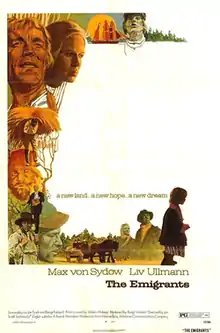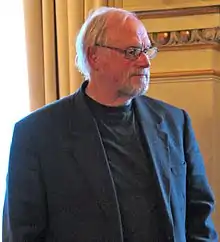The Emigrants (film)
The Emigrants (Swedish: Utvandrarna) is a 1971 Swedish film directed by Jan Troell and starring Max von Sydow, Liv Ullmann, Eddie Axberg and Allan Edwall. The screenplay is by Bengt Forslund and Troell. It tells the story of poor Swedes who emigrate from Småland, Sweden, to Minnesota in the mid-19th century. The film depicts hardships in Sweden and on the journey and is based on the first two novels of The Emigrants series by Vilhelm Moberg — The Emigrants (1949) and Unto a Good Land (1952).
| The Emigrants | |
|---|---|
 | |
| Utvandrarna | |
| Directed by | Jan Troell |
| Produced by | Bengt Forslund |
| Screenplay by | Jan Troell Bengt Forslund |
| Based on | The Emigrants and Unto a Good Land by Vilhelm Moberg |
| Starring | Max von Sydow Liv Ullmann Eddie Axberg Monica Zetterlund |
| Music by | Erik Nordgren |
| Cinematography | Jan Troell |
| Edited by | Jan Troell |
Production company | |
| Distributed by | Warner Bros. (U.S.) |
Release date |
|
Running time | 191 minutes |
| Country | Sweden |
| Language | Swedish |
| Budget | $1.6 million |
The Emigrants won international acclaim, and was nominated for Academy Award for Best Foreign Language Film in 1971. It was nominated for four more Oscars the following year, including for Best Picture. Its 1972 sequel, The New Land (Nybyggarna), produced with the same cast, was also nominated for Best Foreign Language Film. The 1974 U.S. television series The New Land is based loosely on both The Emigrants and its sequel.
Plot
In 1844 in the Swedish province of Småland, the Nilsson family lives in Ljuder Parish, on a small farm in the woods at Korpamoen. The eldest son, Karl Oskar, inherits the farm from his father Nils, after meeting a girl named Kristina Johansdotter, who becomes his bride. She moves to Korpamoen to live with him and his parents. In the following years, Karl Oskar and Kristina start a family, starting with Anna, followed by Johan, Marta and Harald. The family struggles with rock filled fields, poor weather and natural disasters, leaving them with insufficient funds and food. Kristina rebukes Karl oskar for his irreligious attitude. Karl Oskar's daydreaming and bookish younger brother, Robert, tired of being overworked and beaten regularly as an indentured farmhand at a nearby farm, first comes up the idea of emigrating to America. He first asks his friend Arvid, his fellow farmhand, to come with him. Arvid eagerly agrees, but the pair's hopes are dashed when they realize they do not have the money for their passage. Robert confronts Karl Oskar about selling his share of the farm, only to find out that Karl Oskar himself had been considering the idea of emigrating with his family. Despite the potential for a better life, Kristina is unenthusiastic, not wanting to leave her homeland as well as being fearful of risking the lives of their four young children on the ocean. However, the family loses Anna after, hungry and resentful at not being given food, gorges herself on uncooked porridge, damaging her stomach. Devastated by this loss, Kristina agrees to Karl Oskar's plan to emigrate and they begin preparing for the journey.
Meanwhile, Kristina's uncle Danjel Andreasson is being persecuted by the dean for rejecting the official religion and giving fundamentalist religious services in his home. This leads to him, his wife Inga Lena, and their four young children being sentenced to exile. After this, Danjel arrives at Korpamoen to join the emigration party. Danjel plans to bring two of his followers to America, Ulrika of Västergöhl, a former prostitute, and her sixteen-year-old daughter Elin. Robert persuades Danjel to hire Arvid and pay his fare to America. Not long afterwards, a friend and neighbor of Karl Oskar, Jonas Petter, also expresses an interest of going with them to escape his unhappy marriage. The night before their departure, Kristina reveals to Karl Oskar that she is pregnant. The party travels south from Korpamoen to the port city of Karlshamn, where they board the wooden brig Charlotta, which is bound for New York City. On board, Karl Oskar and Kristina meet Mans and Fina Kajsa Andersson, an elderly couple heading for the Minnesota Territory, where they plan to settle on their son's farm near a town called Taylor's Falls. After hearing how good the land is there, Karl Oskar and Kristina decide to follow them. During the voyage, Inga Lena and Mans Andersson die of sudden illnesses, which nearly claims Kristina as well.
Upon their arrival in New York, Karl Oskar and his party, along with Fina Kajsa, begin the long journey westward to Minnesota, first by train, then by riverboat. On the journey from Sweden, the pious Kristina has been prejudiced against Ulrika for her past immorality, but they reconcile during a stop by the riverboat when one of their children goes missing, only to be found by Ulrika. Not long afterwards, tragedy strikes again when Danjel's infant daughter dies after a brief illness. The party finally arrives at the town of Stillwater and with the help of a friendly Baptist minister they find their way to Fina's son's farm, which is just a wooden shack, in what is now known as the Chisago Lakes area. After Danjel and Jonas Petter make their claims to fine tracts of farmland, Karl Oskar heads deep into the woods to explore the lands along the shore of lake Ki Chi Saga, now known as Chisago Lake. Upon his arrival, he finds the topsoil to be of excellent quality and makes a claim to the land for himself and Kristina and their family by carving his name into a tree overlooking the lake.
Cast
- Max von Sydow as Karl Oskar Nilsson
- Liv Ullmann as Kristina Nilsson
- Eddie Axberg as Robert Nilsson
- Pierre Lindstedt as Arvid
- Allan Edwall as Danjel Andreasson, Kristina's uncle
- Monica Zetterlund as Ulrika
- Hans Alfredson as Jonas Petter
- Aina Alfredsson as Märta
- Sven-Olof Bern as Nils
- Gustaf Färingborg as Brusander, The Vicar
- Åke Fridell as Aron
- Bruno Sörwing as Sherriff Lönnegren
- Arnold Alfredsson as Verger
- Ulla Smidje as Inga-Lena Andreasson, Danjel's wife
- Eva-Lena Zetterlund as Elin, Ulrika's daughter
- Bror Englund as Måns Jakob
- Agneta Prytz as Fina Kajsa
- Halvar Björk as Anders Månsson
- Tom C. Fouts as Pastor Jackson
Production
Development
Plans for adapting The Emigrants novels began late in 1967. Its author, Vilhelm Moberg, had seen Jan Troell's film Here Is Your Life before producer Bengt Forslund approached him about an Emigrants film. SF Studios wished to adapt all four novels, although it was uncertain how such a film structure would work.[1]
Moberg requested Forslund and Troell meet him, and the three men mapped out a plot, with 98 scenes, finishing in March 1968. They also envisioned Max von Sydow, Liv Ullmann and Eddie Axberg as the ideal stars.[1] Troell and Forslund went location scouting in the United States in September 1968, but found many of the lands were too developed or could not accommodate film equipment.[2]
Filming

The scenes set in Chisago Lakes were actually filmed at Lake Krageholm in Scania, Sweden. Filming took place from June 1969 to January 1970. More takes were filmed in May to August 1970.[2] Ullmann said that for the two films, shot at the same time, the actors had to learn historic methods of laundry, and that the brief scene in The Emigrants where she is on a swing took two days to film.[3]
The film employed 20 actors and 500 extras. The combined cost of the two films was kr 7 million, then the most expensive Swedish film.[2]
Release
The film was released to cinemas in Sweden on 8 March 1971.[4] The film opened in New York City on 24 September 1972, distributed by Warner Bros.[5] The U.S. version was cut from 190 to 150 minutes.[6]
In the U.S., the film was not released on home video until February 2016, when The Criterion Collection released it on Blu-ray with The New Land. The films were frequently requested by customers.[7] The Emigrants was featured in the 2016 Gothenburg Film Festival.[8]
Reception
Critical reception
The film received mostly positive reviews.[9] Roger Ebert gave it four stars, praising it as a "masterpiece", "infinitely absorbing and moving", and likely more accurate than traditional stories about immigration to the United States.[10] Richard Schickel wrote in Life that "Jan Troell has made the masterpiece about the dream that shaped America - a dream, and an America, fast disappearing from our views".[11] Vincent Canby of The New York Times hailed the acting performances, especially from von Sydow and Ullmann, which he found to hold "a kind of spontaneous truth, in look and gesture, that does a lot to relieve the otherwise programed nobility, truth and beauty". However, Canby criticized Troell for excessive views of "sunlight-reflected-in-water that becomes just one too many, a thing of movie decoration".[5] In New York, Judith Crist praised the film as "exquisite",[12] and that the depiction of history "throbs with flesh and blood".[13] In 5001 Nights at the Movies, Pauline Kael declared the film is "A bursting, resonant work".[6]
In his 2015 Movie Guide, Leonard Maltin gave the film three stars, calling it "Solid if rambling".[14] Dave Kehr recalled it as overrated, "Uncommitted, tedious, and often dishonest".[15] In 2016, the Swedish journal Sydsvenskan recalled The Emigrants as a classic.[8]
Accolades
The Emigrants was nominated for five Academy Awards, including for both Best Foreign Language Film and Best Picture. However, the Academy's rules for eligibility for specific awards meant the nominations occurred in two separate years.[16] It was the third film not in English to be nominated for Best Picture in the history of the Academy.[17]
| Award | Date of ceremony | Category | Recipient(s) | Result | Ref(s) |
|---|---|---|---|---|---|
| Academy Awards | 10 April 1972 | Best Foreign Language Film | Jan Troell | Nominated | [18] |
| 27 March 1973 | Best Picture | Bengt Forslund | Nominated | [19] | |
| Best Director | Jan Troell | Nominated | |||
| Best Actress in a Leading Role | Liv Ullmann | Nominated | |||
| Best Adapted Screenplay | Jan Troell and Bengt Forslund | Nominated | |||
| Golden Globe Awards | 28 January 1973 | Best Foreign Language Film | The Emigrants and The New Land | Won | [20] |
| Best Actress in a Motion Picture – Drama | Liv Ullmann | Won | |||
| Guldbagge Awards | none | Best Film | Utvandrarna | Won | [21] |
| 23 October 1972 | Best Actor | Eddie Axberg | Won | ||
| National Board of Review | 14 December 1972 | Top Foreign Films | The Emigrants | Won | [22] |
| New York Film Critics Circle | 3 January 1973 | Best Actress | Liv Ullmann | Won | [23] |
Legacy

The sequel, The New Land (Nybyggarna), was released in 1972. The 1974 U.S. television series The New Land is based loosely on both The Emigrants and its sequel.[24] The creation of the TV series can be attributed to the popularity of the films.[25] In Sweden, the musical Kristina från Duvemåla by Björn Ulvaeus and Benny Andersson, formerly of ABBA fame, was designed partly in reaction to Troell's films, particularly in differences in the set.[26] Troell also gave his approval to Daniel Espinosa to make a new Emigrants film adaptation in 2015.[27]
The two films were considered to give Jan Troell his "international breakthrough".[28] The films led to his accepting an offer from Warner Bros. to make Zandy's Bride, one of the first times a prominent Swedish director moved to Hollywood since the 1920s.[28]
See also
References
- Wessell 1972, p. 15.
- Wessell 1972, p. 16.
- Ullmann 2006, p. 6.
- "Utvandrarna" (in Swedish). Swedish Film Database. 8 March 1971. Retrieved 21 September 2016.
- Canby, Vincent (25 September 1972). "'The Emigrants,' a Swedish Film Epic, Lands Here". The New York Times. Retrieved 27 November 2016.
- Kael 2011, p. 216.
- Sharf, Zack (17 November 2015). "'The Graduate,' 'The Kid' and More Classics Hitting Criterion Collection in February". IndieWire. Retrieved 27 November 2016.
- Mälarstedt, Kurt (30 January 2016). "Människan i en monter. Jan Troell gjorde film av 4300 år gamla utvandrare". Sydsvenskan. Retrieved 28 November 2016.
- Roberts 2007, p. 125.
- Ebert, Roger (15 January 1973). "The Emigrants". RogerEbert.com. Ebert Digital LLC. Retrieved 27 November 2016.
- Schickel, Richard (1972). "When America was a dream". Life (October 13): 28. Retrieved 2010-01-21.
- Crist 1972, p. 86.
- Crist 1972, p. 87.
- Maltin 2014.
- Kehr, Dave. "The Emigrants". Chicago Reader. Retrieved 27 November 2016.
- D'Angelo, Mike (6 February 2016). "Jan Troell's The Emigrants and The New Land work best as one very long movie". The A.V. Club. Retrieved 28 November 2016.
- Benson, Raymond (3 February 2016). "'The Emigrants' / 'The New Land' (1971/1972; Jan Troell) Starring Max Von Sydow and Liv Ullmann (The Criterion Collection)". Cinema Retro. Retrieved 28 November 2016.
- "The 44th Academy Awards (1972) Nominees and Winners". Academy of Motion Picture Arts and Sciences. Retrieved 2011-11-27.
- "The 45th Academy Awards Winners & Nominees". Academy of Motion Picture Arts and Sciences. Retrieved 28 November 2016.
- "The Emigrants". Hollywood Foreign Press Association. Retrieved 28 November 2016.
- "Utvandrarna (1971)". Swedish Film Institute. 2 March 2014.
- "1972 Award Winners". National Board of Review. Retrieved 28 November 2016.
- Crist, Judith (28 January 1974). "To Set the Tube Aglow". New York. p. 59.
- Brooks & Marsh 1995, p. 738.
- Rafferty, Terrence (9 February 2016). "The Emigrants/The New Land: Homelands". The Criterion Collection. Retrieved 27 November 2016.
- Nyström, Martin (27 October 2014). "Göteborgsoperan: 'Kristina från Duvemåla'". Dagens Nyheter. Retrieved 28 November 2016.
- Lindblad, Helena (16 May 2015). "Svenska storfilmer presenterades i Cannes". Dagens Nyheter. Retrieved 28 November 2016.
- Lunde 2015, p. 232.
Bibliography
- Brooks, Tim; Marsh, Earle (1995). The Complete Directory to Prime-Time Network and Cable TV Shows, 1946-Present (Sixth ed.). New York: Ballantine Books. ISBN 0-345-39736-3.
- Crist, Judith (25 September 1972). "Compassionate Epic". New York.
- Kael, Pauline (2011). 5001 Nights at the Movies. Henry Holt and Company.
- Lunde, Arne (2015). "Going Hollywood: Nordic Directors in American Cinema". Nordic Genre Film. Edinburgh University Press. ISBN 978-0748693191.
- Maltin, Leonard (2 September 2014). Leonard Maltin's 2015 Movie Guide. Signet. ISBN 978-0698183612.
- Roberts, Kate (2007). Minnesota 150: The People, Places, and Things that Shape Our State. Minnesota Historical Society Press. ISBN 978-0873515948.
- Ullmann, Liv (2006). Long, Robert Emmet (ed.). Liv Ullmann: Interviews. University Press of Mississippi. ISBN 157806824X.
- Wessell, Nils Y. (1972). The American-Swedish '72. Philadelphia, Pennsylvania: American Swedish Historical Foundation. ISBN 1422365506.